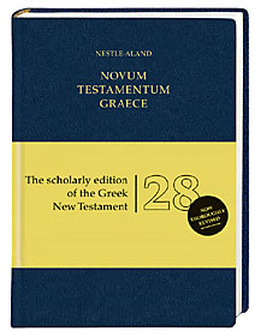 The 28th Edition of the Nestle-Aland Greek New Testament is here. Peter Williams provides an exhaustive review here that will answer all your questions. Novum Testamentum Graece 28 Are you going to jump on board, get rid of your UBS3 or 4 and NA27? What are your thoughts?
2 Comments
4/6/2013 07:03:07 am
Thanks for sharing the review! I'll have to look into it. For now, I'm good with what I've got. For one thing, I'm too poor to buy a new one. :-) And second, textual critics (whether lay or scholar) need to make a lot of these decisions for themselves. Metzger's textual commentary and things like that are helpful for folks like us make our own decisions as we go (thoughts?). Now, if they uncovered six new first century papyri, well, I'd get an updated critical apparatus. As I'm sure we all would!
Reply
4/6/2013 11:20:09 am
John, I agree completely. If I remember correctly, there is something like 34 changes in the universal epistles from NA27 to NA28 in the text. The textual apparatus has been updated and changed, and supposedly simplified, which would be a good thing. I honestly don't even own an NA27, I just use the UBS4 and am very content with it. I love Metzger's Textual Commentary and find it to be an indispensable tool for anyone who wants to know what the Greek says.
Reply
Leave a Reply. |
Categories
All
Archives
July 2019
Pages I like |